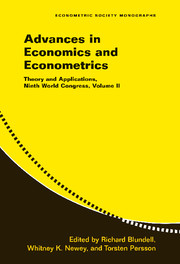Book contents
- Frontmatter
- Contents
- Contributors
- Introduction by the Editors
- Advances in Economics and Econometrics
- 1 Empirical Models of Auctions
- 2 Identification in Models of Oligopoly Entry
- 3 Empirical Models of Imperfect Competition: A Discussion
- 4 Recent Developments in the Economics of Price Discrimination
- 5 Bounded Rationality in Industrial Organization
- 6 Price Discrimination and Irrational Consumers: Discussion of Armstrong and Ellison
- 7 Behavioral Economics
- 8 Incentives and Self-Control
- 9 Discussion of “Behavioral Economics”
- 10 Dynamic Models for Policy Evaluation
- 11 Microeconometric Search-Matching Models and Matched Employer-Employee Data
- 12 Discussion of ‘Dynamic Models for Policy Evaluation’ and ‘Microeconometric Search-Matching Models and Matched Employer-Employee Data’
- 13 Field Experiments in Development Economics
- 14 Institutions and Development: A View from Below
- Index
- Titles in the series
9 - Discussion of “Behavioral Economics”
Published online by Cambridge University Press: 05 January 2013
- Frontmatter
- Contents
- Contributors
- Introduction by the Editors
- Advances in Economics and Econometrics
- 1 Empirical Models of Auctions
- 2 Identification in Models of Oligopoly Entry
- 3 Empirical Models of Imperfect Competition: A Discussion
- 4 Recent Developments in the Economics of Price Discrimination
- 5 Bounded Rationality in Industrial Organization
- 6 Price Discrimination and Irrational Consumers: Discussion of Armstrong and Ellison
- 7 Behavioral Economics
- 8 Incentives and Self-Control
- 9 Discussion of “Behavioral Economics”
- 10 Dynamic Models for Policy Evaluation
- 11 Microeconometric Search-Matching Models and Matched Employer-Employee Data
- 12 Discussion of ‘Dynamic Models for Policy Evaluation’ and ‘Microeconometric Search-Matching Models and Matched Employer-Employee Data’
- 13 Field Experiments in Development Economics
- 14 Institutions and Development: A View from Below
- Index
- Titles in the series
Summary
WHAT IS THE BEHAVIORAL ECONOMICS “REVOLUTION”?
For me, economics is a collection of ideas and conventions that economists accept and use to reason with. Namely, it is a culture. Behavioral economics represents a transformation of that culture. Nonetheless, as pointed out by Camerer and Loewenstein (2003), its methods are pretty much the same as those introduced by the game theory revolution. At the core of most models in behavioral economics there are still agents who maximize a preference relation over some space of consequences and the solution in most cases still involves standard equilibrium concepts. However, the behavioral economists are not committed to what is usually referred to as rational motivations. An economic fable (or a model, as we would call it) that has at its core fairness, envy, present-bias and the like, is by now not only permitted but even preferred.
Why now? Perhaps, economists have finally realized that orthodox economic models are too unrealistic and dogmatic. And perhaps it is the result of our constant search for new directions in research. One might also ask why other ideas (such as those of bounded rationality) are less welcome than those of behavioral economics. I think that this is because the profession prefers progress in small steps. The models of behavioral economics are not that different from those of applied economics and thus are not perceived as a threat.
- Type
- Chapter
- Information
- Advances in Economics and EconometricsTheory and Applications, Ninth World Congress, pp. 246 - 254Publisher: Cambridge University PressPrint publication year: 2006
- 18
- Cited by



